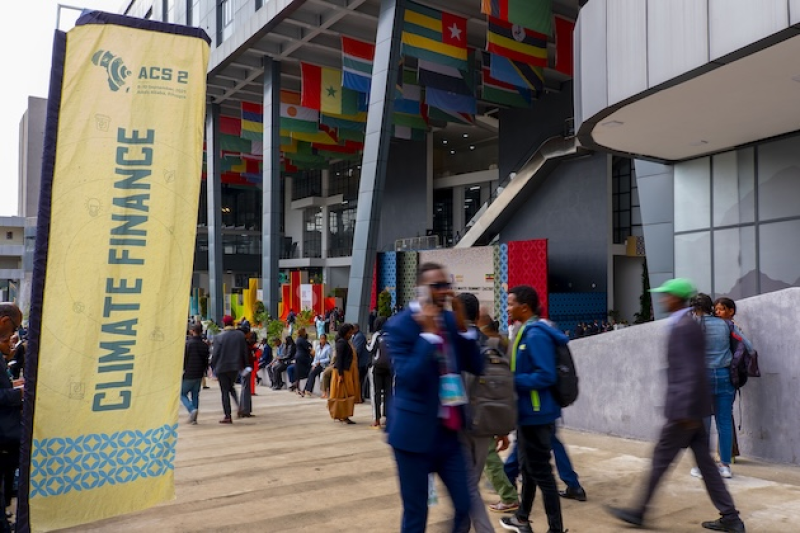- U.S. Embassy Dhaka Welcomes Ambassador-Designate Brent T. Christensen |
- Survey Shows Tight Race Between BNP and Jamaat-e-Islami |
- Yunus Urges Lasting Reforms to End Vote Rigging |
- Govt Cuts ADP to Tk2 Lakh Crore Amid Fiscal Pressure |
- Home Adviser Urges Ansar Professionalism for Fair Polls |
Africa Launches Health Curriculum Ahead of COP30

Delegates at the Second Africa Climate Summit in Addis Ababa, Ethiopia.
Despite climate change being a health risk multiplier, health is often underrepresented in climate negotiation processes.
Experts attribute this to a lack of funding from African governments and insufficient capacity building among climate negotiators.
At the Second Africa Climate Summit (ACS2) in Addis Ababa, Ethiopia, from 8 to 10 September, health experts called for funding to bring health negotiators to the table at the Conference of the Parties (COP30) in Belém, Brazil, to demand more support for the health sector.
Amref Health Africa, a Kenya-based non-governmental organization providing community and environmental healthcare across Africa, launched a Climate Change and Health Negotiators’ curriculum on 9 September at the summit.
The curriculum, developed for the African Group of Negotiators (AGN), seeks to address this gap by equipping African negotiators with technical expertise, policy knowledge, and advocacy skills required to integrate health considerations into climate policy and finance agendas.
Desta Lakew, group director of partnerships and external affairs at Amref Health Africa, said that when they began conversations on climate and health, health was not included.
“At COP27 in Sharm El Sheikh, Egypt, there were no health ministers because health was not included. We thought we needed to bring the health issues in Africa,” she said at a side event at the Rockefeller Foundation Pavilion during the ACS2.
“We have developed a curriculum to bring health into the climate negotiation process. AGN speaks for us and for people in rural areas affected by climate change.”
At COP29 in Dubai in 2023, health was included only in the declaration, but this was still seen as progress by climate experts.
Although Africa contributes less than 4 percent of global greenhouse gas emissions, it continues to experience severe effects of climate change.
Climate change threatens health by increasing heat-related illnesses, worsening respiratory conditions and air quality, expanding the spread of infectious diseases, and disrupting food and water security.
Extreme weather events such as floods in Africa cause injuries and distress while also damaging essential health infrastructure.
In southern Africa, countries including Botswana, eSwatini, Namibia, and Zimbabwe experienced a dramatic surge in malaria cases in 2025. From 2023 to 2024, the region faced El Niño-induced drought. In 2025, La Niña brought prolonged rainfall, fuelling mosquito breeding.
In other parts of the continent, climate variability is also facilitating the spread of non-communicable and infectious diseases such as dengue, malaria, West Nile virus, and Lyme disease.
Climate change is not just an environmental issue—it is a health emergency. Yet, only a fraction of climate funding goes to the health sector.
Many health systems in Africa, already underfunded and collapsing, were not designed for such pressures. They are now overwhelmed, under-resourced, and on the brink.
The World Meteorological Organization (WMO), in a report last year, revealed that Africa is warming faster than the rest of the world. The report said African countries lost up to 5 percent of their GDP on average, with many forced to allocate 9 percent of their budgets to address climate extremes.
The WMO estimated that the cost of climate adaptation in sub-Saharan Africa will range between USD 30 and 50 billion annually over the next decade. Adaptation and climate finance could make a difference, improving access to health infrastructure, smart agriculture, and nutrition.
However, Africa currently receives less than 5 percent of global climate finance.
The Climate Change and Health Negotiators’ curriculum was developed with support from partners including AGNES and Africa Centres for Disease Control and Prevention (Africa CDC), a specialized technical body of the African Union.
Dr. Modi Mwatsama, head of capacity and field development for climate and health at Wellcome Trust, said the curriculum would ensure that Africa’s health issues are prioritised in climate negotiations.
Dr. Martin Muchangi, director for population health and environment at Amref Health Africa, said the curriculum targets negotiators, including health and environment ministers, as well as mid-level state and non-state actors.
He said the aim is to train negotiators to understand the technical aspects of climate and health. The curriculum will serve as a reference point.
“We want health to be at the negotiating table. We want to empower AGN by building the capacity of negotiators,” Muchangi said.
He added that the curriculum will equip negotiators to use evidence and data to make a strong case at COP30 in Brazil and develop actionable plans.
Dr. Petronella Adhiambo, a capacity-building officer at AGNES, said the curriculum is aligned with their goal of ensuring health features in climate negotiations.
Dr. Jeremiah Mushosho, regional team lead for climate at the World Health Organization, said the curriculum is aligned with Global Climate Action and relevant to Africa’s needs.
“This is quite a big opportunity to prepare negotiators and create a regional pool of climate expert negotiators,” he said, stressing the need for equitable allocation of resources.
Dr. Yewande Alimi, Antimicrobial Resistance and One Health Unit lead at Africa CDC, said her organisation will amplify this initiative.
“This curriculum is timely. Africa will no longer just sit at the negotiating table, but negotiators will be able to demonstrate that health must be prioritised,” she said.
Health experts also called for more funding to bring health and environment ministers to COP30 to demand greater investment in the health sector.

